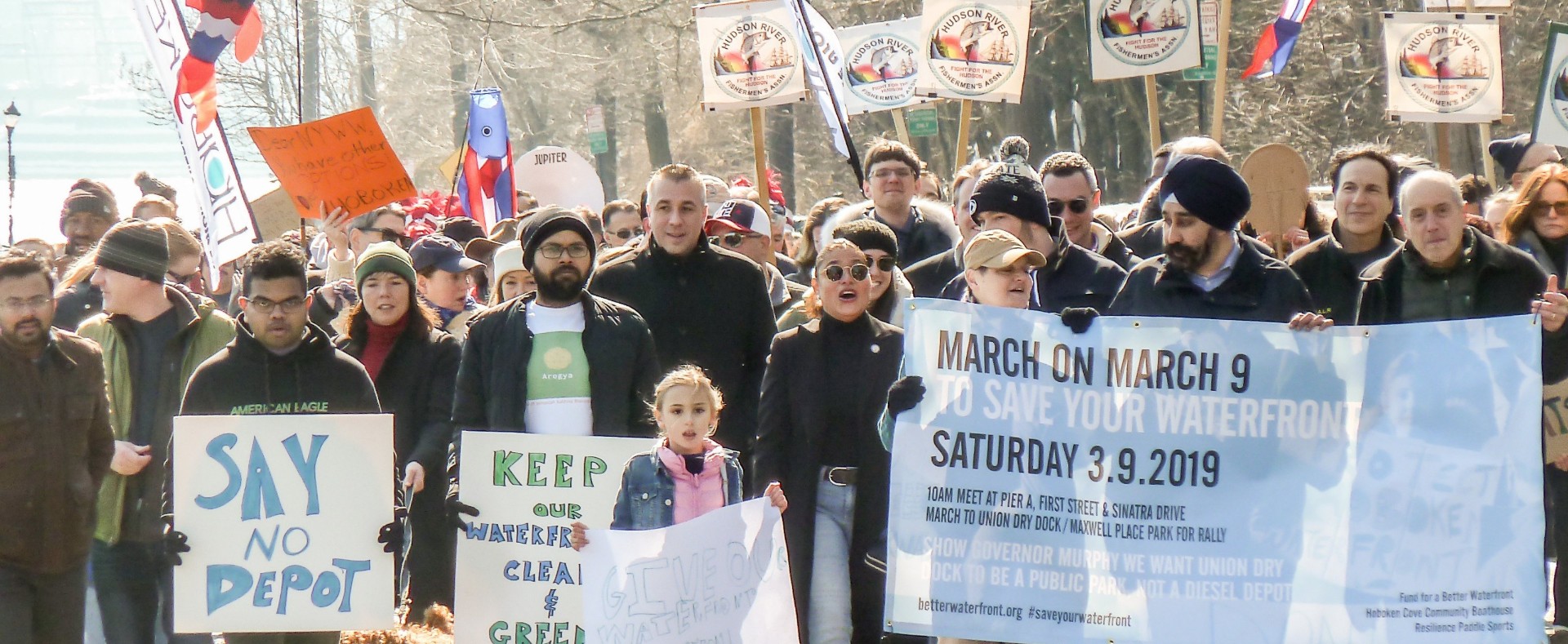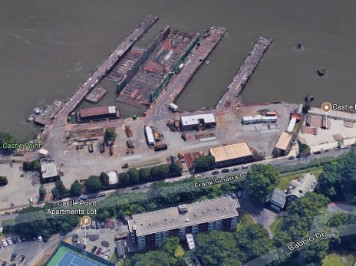FBW’s 1990 proposal for a continuous, public waterfront park nears completion

FBW | December 7, 2022
After years of conflict followed by several more years of negotiations, a saga has come to an end. The City of Hoboken now owns Union Dry Dock. This three-acre site will complete one of the final missing links to Hoboken’s continuous, public park fronting the Hudson River.
The idea for a continuous park along the Hudson River was first proposed by the Fund for a Better Waterfront (FBW) with its 1990 Plan for the Hoboken Waterfront. FBW’s 32 years of advocacy has transformed Hoboken’s former industrial waterfront into a beloved public space stretching for most of the city’s 1.5-mile long coastline.
After being elected mayor in 2017, Ravi Bhalla made securing a park at Union Dry Dock his top priority. Mayor Bhalla and other local elected officials, FBW, the Hoboken Cove Community Boathouse and people throughout the Hoboken area joined forces to prevent a diesel ferry refueling and repair facility from locating at this site formerly used for repairing barges.
In June 2021, Mayor Bhalla and Governor Murphy announced that an agreement had been reached allowing the City to acquire the site from NY Waterway. But protracted delays prompted the City to adopt an eminent domain ordinance last October. After the City’s appraiser valued the property at $13.36 million, in accordance with New Jersey law, the City of Hoboken deposited that amount into New Jersey Superior Court. Then the City recorded a Declaration of Taking with the Hudson County Register, thereby gaining title.
The delays occurred due to controversy in Weehawken about the expanded ferry facility proposed there. NY Waterway has continued a cooperative relationship with the City of Hoboken as the eminent domain process has moved forward. In the end, the two parties are expected to settle on the $18.5 million purchase price agreed to in 2021.
Today, the City also sent out a request for proposals to professional firms for designing the park. FBW has been advocating for a traditional, passive park at Union Dry Dock, with an abundance of shade trees and other green space similar to the award-winning landscape plan at Hoboken’s South Waterfront. FBW’s Executive Director, Ron Hine, exclaimed, “A park at Union Dry Dock will dramatically transform this part of the waterfront that has been inaccessible to the public for more than a century. Maxwell Place Park will be fully connected with Castle Point Park to the south. This will benefit the public for generations to come.”
FBW has monitored the status of the Union Dry Dock site going back several decades as the company sought to find a buyer. When the asking price was reduced in 2016, FBW urged former Mayor Dawn Zimmer to acquire the site for use as a public park. FBW collected over 2,000 signatures on a petition that it submitted to the Mayor and City Council. The City, however, failed to act and in November 2017, NY Waterway purchased the Union Dry Dock property. What ensued was a sometimes bitter and contentious battle.
In 2018, the NJ Transit Board was slated to approve acquiring Union Dry Dock from NY Waterway for use as a ferry refueling/repair facility. Opponents, including local elected officials, packed the meetings at NJ Transit’s Newark headquarters causing the Board to back down. FBW organized letter-writing and social media campaigns to pressure Governor Murphy. In 2019, FBW organized the March on March 9 where over 500 people, led by Mayor Bhalla, trooped up the waterfront for a rally at Maxwell Place Park, just to the north of the dry dock site. FBW also uncovered a NJ Transit study that determined that five other sites were more suitable for a ferry maintenance facility, including the Hoboken Terminal.
In 1976, Union Dry Dock and Repair Co. purchased the site from the trustees of Penn Central Railroad which had gone bankrupt in 1970. Penn Central used this property for its marine division that included a fleet of tug boats for much of the last century. The site was vacant during the 1970s and early 1980s until Union Dry Dock began operations there repairing barges.
Related Links
After protracted delays, City takes action to expedite acquisition of Union Dry Dock site
After a contentious, multi-year battle, City will acquire Union Dry Dock
The transformation of Hoboken’s waterfront & creation of a continuous park
Making the “green circuit” greener along Hoboken’s waterfront
Construction of a long-awaited waterfront park at the Weehawken Cove
City to make offer to buy Union Dry Dock
2009 NJ Transit study identifies 5 sites more suitable for ferry facility than Union Dry Dock
Union Dry Dock: Potential Parkland for Sale
FBW’s 30-year history

